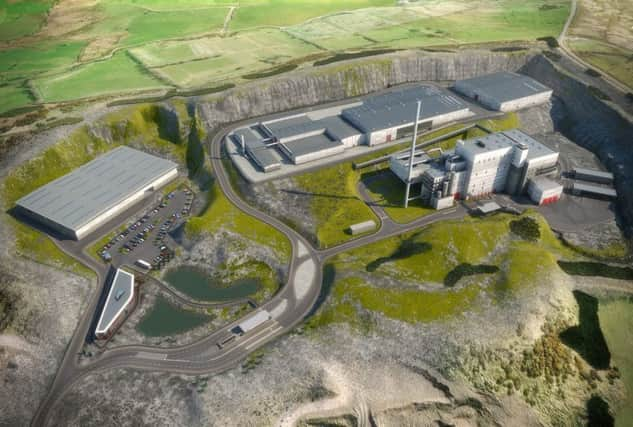Mallusk EfW plant '˜still essential element in waste treatment plan'


The plant at the former Hightown Quarry has been widely attacked and was refused planning permission in September last year.
However, the Becon Consortium behind the controversial project claims it has been boosted by the acknowledgment from the Department of Environment that EU law has signalled a “significant shift in the future direction of travel for waste management” and will have a “major impact” on waste management infrastructure requirements.
Advertisement
Hide AdAdvertisement
Hide AdFollowing approval for an increase in processing capacity at an energy from waste (EfW) plant under development by Bombardier, John Ahern of the Becon Consortium said; “Planning approval for the increased waste throughput for the Bombardier Energy from Waste facility in East Belfast is welcome evidence that the Department recognises the need for increased thermal treatment capacity in Northern Ireland.
“The clarity provided by the DOE Environmental Policy Division that new European proposals will also dramatically increase the need for additional energy from waste capacity here.
“The European proposals also set more ambitious targets for recycling and it is important to remember that a significant proportion of the footprint of the Becon project includes recycling infrastructure which could Increase arc21’s constituent councils’ overall recycling rates by up to 10%.
“Together these developments now paint a very clear picture of the need for Northern Ireland to catch up with the rest of Europe and to put in place the necessary infrastructure to both manage our waste more sustainably and maximise its value through material and energy recovery.
Advertisement
Hide AdAdvertisement
Hide AdAt the heart of the Becon claim is an analysis by the DoE which suggests that proposals to increase recycling rates from the current 50% by 2020 to 65% by 2030, coupled with a reduction in the permitted waste to landfill, will have a major impact on waste infrastructure requirements in Northern Ireland.
They consider that a rough assessment based on these proposals would require around two to three times the current assessed thermal waste treatment needs – from between 200,000 tonnes-305,000 tonnes to around 668,000-759,000 tonnes per year.
“We believe the £240m Becon project, designed to deal with municipal black bin waste from the arc21 council area is a vital part of the solution to meet that growing need,” said Mr Ahern.
“It will provide the type of proven and reliable infrastructure that Northern Ireland needs to manage its waste and at the same time help it meet its European obligations. We have also always contended that the project has been entirely consistent with the private sector Bombardier waste facility and that there is more than enough waste for both projects.